Defending a world title in rival territory
Location, location, location - it is the number one rule for realtors and should be a rule for race...
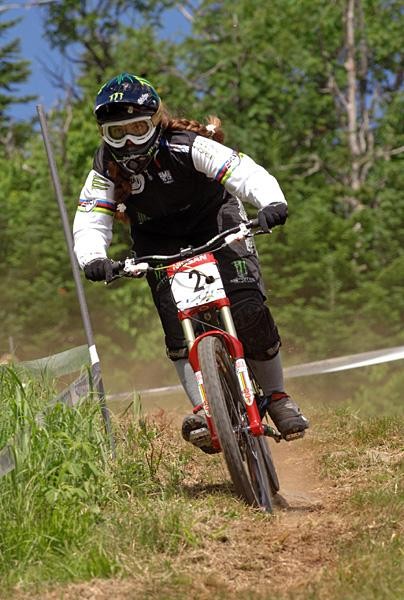

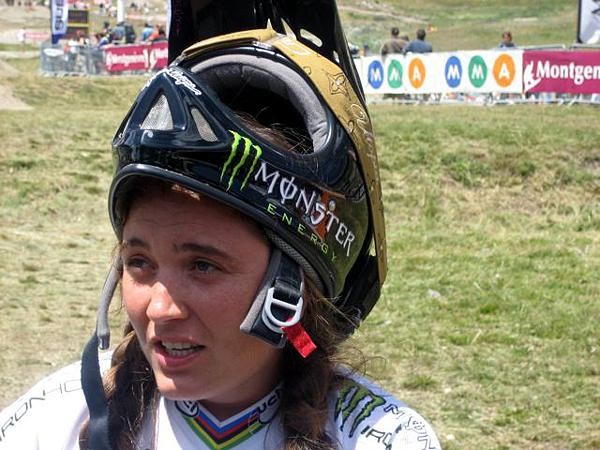
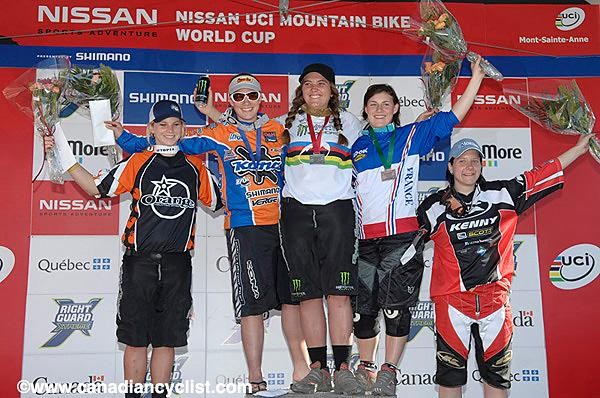
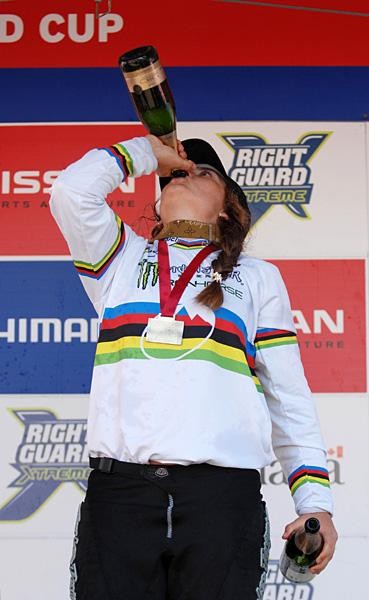
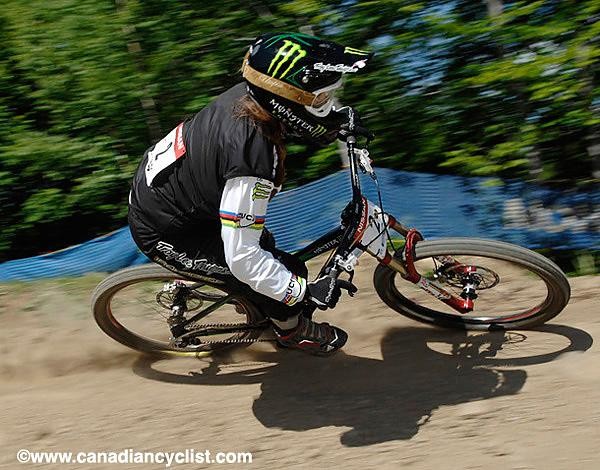
An interview with Sabrina Jonnier, August 28, 2007
Location is everything when it comes to bike racing. It sets the tone for a race, its weather, who shows up, and the mood and subsequent performances of both racers and reporters. Cyclingnews' Wendy Booher interviewed French gravity star Sabrina Jonnier at the French National Mountain Bike Championships, where Jonnier won her second national downhill title.
Location, location, location - it is the number one rule for realtors and should be a rule for race reporters, like this one, who always got the impression of Sabrina Jonnier as aloof, based on circumstances surrounding a certain mid-April sporting event. To evoke an intriguing interview with Sabrina Jonnier at the Sea Otter Classic seemed nearly impossible, which is why location really matters to a racer with regard to weather, course condition, and competition. That is why it was like meeting Sabrina Jonnier for the first time this past July shortly after she took the French national title in the women's downhill competition. Articulate, provocative, and stunningly gracious, Jonnier exhibited an aptitude and decorum that defined the very essence of a world champion.
When the Mountain Bike World Championships come to Fort William, Scotland, September 3-9, Jonnier will need to defend her world championship downhill title on a course she's never won on against two of her strongest competitors. Far from her sunny, temperate training ground near her home in Hyères, France, Fort William is a meteorological crapshoot. What's more, her two rivals are also locals who have placed better than her on the Fort William course in previous years.
"The last two years, it has been (Tracy) Moseley and Rachel (Atherton) in first and second," said Jonnier. "I've never won over there. I've always finished third or second, so defending the rainbow stripes will be interesting."
Jonnier may be primed to attain the (so-far) unattainable since earlier this season she achieved a rare, elusive success in her native France. When the French National Mountain Bike Championships took place this past July, Jonnier took her place along with twelve of her countrywomen. The French Alps' setting and cool alpine weather slightly mimicked Sea Otter weather conditions, however the slippery, rugged downhill course at Montgenevre demanded full-suspension and skill, experience, and ambition - all of which Jonnier has amassed in abundance thanks to one, pesky rival.
Learning from the best
Get The Leadout Newsletter
The latest race content, interviews, features, reviews and expert buying guides, direct to your inbox!
Absent from competition was the practically indomitable Anne-Caroline Chausson, who has frustrated Jonnier at the national championships for more than a decade by taking the national title (and often the world title) in either downhill and 4X, or sometimes both in the same year. Despite multiple runner-up finishes to Chausson's successive victories, Jonnier learned that mental training was as much of Chausson's strategy as physical training was.
"I will say that what I learned from Anne-Caroline Chausson was the mentality to keep winning," said Jonnier. "It's hard to be 100 percent at every race, and that's what I found really wonderful about her - her mental strength that made her go to every race and win every single one."
Jonnier found similarities between the national championship course and her former training ground in Australia, where she lived for three years with her boyfriend, Sam Hill. When Hill also won the world champion's title for downhill last year, it seemed like a gravity dynasty in the making: the two top downhill racers in the world riding for the same team (Monster Energy/Iron Horse) from two of the mightiest nations in gravity racing both earning world titles in the same year. But then the kingdom fell apart, and Hill and Jonnier have since gone their separate ways.
A return to 4X
Before the split though, Jonnier learned how to ride the slippery dirt of Hill's native Australia and her experience paid off at the French Nationals. She collected her second national title of her career in the downhill, which she coveted doubly since she decided not to race 4X after crashing hard three years ago at a race in Whistler, British Columbia.
There, Jonnier went over the bars and slammed into the ground with enough impact to lacerate her liver. The crash earned her seven blood transfusions and a three-week stay in a Vancouver hospital, which Jonnier figured was reason enough to give up 4X.
However, one week after winning the national downhill competition this year, the French Cycling Federation dispatched its best gravity women to the European Downhill and 4X Championships in Greece with an expressed desire to bring home top honors in both disciplines. At the urging of the French team and since the 4X course lacked the difficulty of the treacherous Whistler course, Jonnier signed up for her first 4X race in some time. France reaped the rewards of its dedication to off-road racing with a clean sweep of the women's podium in downhill and the top two spots in 4X. Jonnier won both events.
The French Empire
Why France seems to possess such remarkable strength in gravity racing seems to be unanswerable, even by the athletes themselves.
"Everybody asks me that question, and I don't know," replied Jonnier. "Maybe it's because in France we love racing bicycles. We have the Tour de France every year, but I'm not a big fan of that. I think also that it's the way our (cycling) federation is; we have a pretty good budget to help riders, and I'd guess there probably exists a passion for cycling here, too."
The image of gravity racers took on a new look just as Jonnier entered the sport and, along with other racers like Moseley, Atherton, Jill Kintner, Melissa Buhl, Tara Llanes, and April Lawyer, it doesn't take a rocket scientist to understand why gravity racing attracts so much television coverage in France, the US, and elsewhere. Jonnier drapes her long brunette braids over the rainbow stripes jersey for competition and, anytime she wins - which is most of the time these days - Jonnier answers every post-race interview question as though she were lucky to have had the chance to compete.
Graciousness is something she has no doubt learned from years of standing on the podium's second or third place platform.
"For me, I am a bad loser," confessed Jonnier. "I love winning and I think that's what makes a pro athlete. We work really hard all winter, Stephan Girard is my trainer and he is also (Greg) Minaar's coach too. We do road rides in the winter, cross-country running, gym sessions for strength training, and more technical downhills and a bit of 4X/BMX before the start of the season."
Jonnier's poise, grace, and hard work will come in handy on September 9, when the final event for the elite women's downhill takes place. She will be unmistakably noticeable in the white world champion's jersey, which she hopes to bring home once again for another year.
Should she accomplish this, she will notch her already noteworthy career with yet another title, strengthen France's reputation for producing world-class gravity racers, and be able to continue in a job she loves but which hasn't always returned the affection.
Sea Otter, crashes, and second place finishes aside, when she arrives in Scotland to defend her jersey, Jonnier will be out to prove that winning depends less on a place and more on a state of mind.